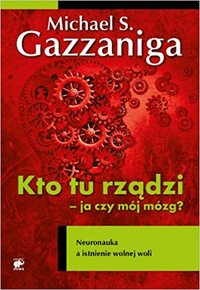Take a photo of a barcode or cover
36 reviews for:
Kto tu rządzi – ja czy mój mózg? Neuronauka a istnienie wolnej woli
Michael S. Gazzaniga
36 reviews for:
Kto tu rządzi – ja czy mój mózg? Neuronauka a istnienie wolnej woli
Michael S. Gazzaniga
[a:Gazzaniga Michael|16047467|Gazzaniga Michael|https://s.gr-assets.com/assets/nophoto/user/u_50x66-632230dc9882b4352d753eedf9396530.png] é um médico que trabalhou com pacientes com o cérebro dividido em dois e descobriu em primeira mão como dois cérebros geram uma mente coerente e única. É um trabalho muito interessante e as histórias dos pacientes que ele conta são fantásticas. O livro realmente vale pela primeira metade, onde ele fala da nossa falta de livre-arbítrio, apesar da ilusão na direção contrária.
Na segunda metade, o livro dá uma guinada para propriedades emergentes, interação social e outros sistemas, em uma tentativa de resgatar o que pode trazer espontaneidade e livre-arbítrio. Mas fica um tanto forçado, por não ser a área de especialidade dele. E um tanto desconexo com o resto do livro. Ainda vale pela primeira parte, de qualquer forma.
Na segunda metade, o livro dá uma guinada para propriedades emergentes, interação social e outros sistemas, em uma tentativa de resgatar o que pode trazer espontaneidade e livre-arbítrio. Mas fica um tanto forçado, por não ser a área de especialidade dele. E um tanto desconexo com o resto do livro. Ainda vale pela primeira parte, de qualquer forma.
informative
reflective
medium-paced
informative
reflective
slow-paced
An informative book on neuroscience with attempts to explain and understand free will.
One of my all time favorite books. If you’re reading reviews of this book it means you’re interested in neuroscience, free will, what consciousness is, or how our society should operate as our understanding of the brain changes so you should go read it! This book does not fail to deliver on those deep questions. The author is very knowledgeable but also has a great sense of humor and humility. Topics discussed touch on many other diverse areas such as judicial reform, complexity theory, and mindfulness. I’d be shocked if someone who is interested in this topic didn’t completely love this book.
Intriguing book, with lots of terrific insights and ideas. Neurobiology for the common person. There was only one spot where I glazed over.
My only exception to the book was on page 157 where he describes the theories of Hare and Tomasello that constraining individual behavior -- for the social good -- eventually lead to genetic changes. That the cooperative nature of people, evidenced by building the pyramids and Roman aqueducts, has genetically reduced people's aggressive behavior.
I thought those grand structures were built by slaves. How did that change the game?!?! And the genetic makeup of humans? While we are more peaceful that in times past, despotism has not been weaned from the gene pool. I'm not sure I agree with the theory, at least not as described here.
I do recommend the book.
My only exception to the book was on page 157 where he describes the theories of Hare and Tomasello that constraining individual behavior -- for the social good -- eventually lead to genetic changes. That the cooperative nature of people, evidenced by building the pyramids and Roman aqueducts, has genetically reduced people's aggressive behavior.
I thought those grand structures were built by slaves. How did that change the game?!?! And the genetic makeup of humans? While we are more peaceful that in times past, despotism has not been weaned from the gene pool. I'm not sure I agree with the theory, at least not as described here.
I do recommend the book.
informative
slow-paced
informative
slow-paced
informative
reflective
medium-paced
Some of his statements are very objective and well-researched (by his research team or other research teams). However, what I didn't like about his book is that he presents a lot of his own opinions and thoughts (especially about the superiority and exceptionalism of humans, as well as the importance of the narrative part of consciousness) as facts without properly supporting them with evidence. In fact, a lot of his writing seemed to be filled with academic egotism and self-applause. There were some studies about the brain that he mentioned which were fascinating, so parts of the book were worth reading.
informative
reflective




